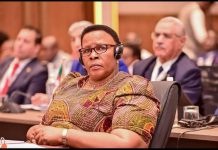Africa-Press – Zimbabwe. AS the sun rises in the rural outskirts of Chief Mjinga’s jurisdiction, Melania’s day starts as she sets out to fetch water from a nearby river.
At 12, she makes it a point to have enough water for her widowed mother.
The girl is attending Kangurunguru Primary School in Hurungwe rural district council’s ward 14.
As a Grade 5 learner, Melania has nothing to show in terms of modern digital items, including a cellphone.
“I pray that one day, I will own a smartphone. Very few of my schoolmates possess such,” she said.
Clutching a worn out plastic bag resembling a satchel, the girl is part of rural statistics in this marginalised area that lack basic technological gadgets.
The school, situated about 120km east of Karoi farming town, was established two decades ago.
It has an enrolment of over 300 pupils.
The community members expressed their dissatisfaction over the widening digital gap among schools within Hurungwe district, Mashonaland West province.
Lameck Mubaira (48) says the young generation’s future is ruined due to the digital divide.
“Our children are literally left out,” said Mubaira, a father of three, two of whom are enrolled at Kangurunguru Primary School.
“Unlike other students in urban areas, our children hardly understand the use of digital items.
“Very few can afford to buy phones that they can use in school.”
He admitted that use of phones at school was not a priority, adding that securing computers for the school was proving to be a big challenge.
“I want my children to have an understanding about life, and this can be achieved through engaging technology. It’s not justified in rural communities to push for the modern lifestyles,” he explained.
Chipo Makayi, another villager, said girls were looked down upon by some families.
“It’s unfortunate that some parents still don’t believe in empowering girls through education, including access to digital necessities,” she said.
“All things being equal, every child deserves a chance in life.”
Some children around Kangurunguru Primary School are in the same predicament with those among several children in Mazhaka resettlement area under ward 9 in Hurungwe, where scores of children are not going to school due to lack of educational facilities.
Ward 19 councillor Samuel Mabhera expressed his frustrations.
“It may sound strange, where some affected children are now 18 old years without setting their feet in class, let alone setting eyes on a computer. Some of the affected communities are within Mazhaka resettlement area,” he said.
“We still have young children that have been denied the right to education due to long distances from one point to the other.”
Mabhena further explained that some of the affected children used to travel for 18km from Kapena to Oldenue Farm, which has an established school.
“Through community participation, we moulded 180 000 bricks to build a school block so that the distance is reduced,” he said.
“The new school covers Grades 1 to 5. But that is it. It’s only an empty school, no computers, no power.”
Hurungwe East MP Chenjerai Kangausaru admitted that a lot needs to be done in improving educational facilities and ICT infrastructure in the constituency.
“Education is one of my major priorities, I will strive to seek and get assistance for the affected communities around the constituency,” he said in an interview with NewsDay Weekender.
“I have noted the concerns of long distances such that we will engage Hurungwe Rural District Council to partner some stakeholders so that the right to education and health is fulfilled as required. No one must be left behind.”
Kangausaru has since moved a motion in Parliament to help in bridging the ICT divide in and around Zimbabwe.
Kangausaru said the digital divide between rural and urban, with special emphasis on girl child, is a pressing issue that affects particularly rural communities and the girl child.
“The digital divide between rural and urban areas is a stark reality that perpetuates inequality, hinders economic growth and limits opportunities for social mobility,” he said.
“Zimbabwe, like many other developing countries, is experiencing a growing digital divide between urban and rural areas.
“Urban centres have better access to reliable internet, digital devices, and technological infrastructure, while rural communities, especially those in remote areas, often face significant barriers to connectivity, limiting their ability to participate fully in the digital economy and access essential services.”
Kangausaru added that the plight of the girl child could not be overemphasised and the digital gap seems to exacerbate these challenges which include access to education, healthcare and economic opportunities.
Research has shown that in any household, girls are more disproportionately impacted by the digital divide.
Most households, cultural norms prioritise boys’ access to education and technology, often leaving girls at a disadvantage.
Kangausaru, however, applauded the government through the Postal and Telecommunications Regulatory Authority of Zimbabwe (Potraz) in its bid to bridge this gap and create a more inclusive digital environment. He said more needs to be done to cover the whole country, especially marginal areas in as far as ICTs are concerned.
“Our government has recognised the critical need to ensure equitable access to digital resources, and this has been reflected in various national policies aimed at addressing the digital divide,” he said.
The National ICT Policy, for example, emphasises the need to provide ICT infrastructure to underserved areas and special attention is given to empowering women and girls in technology.
“Potraz has played an instrumental role in expanding the digital landscape across Zimbabwe through initiatives like the Universal Service Fund, focusing on ensuring that rural communities, where many of our girls live, are not left behind,” the parliamentarian said.
“The fund has enabled the expansion of mobile networks and internet connectivity to these remote areas, which has opened up a world of possibilities for young girls.
“This has been achieved through the establishment of communication information centres at growth points and computer labs at schools in isolated areas.”
ICT minister Tatenda Mavetera said government remained concerned with digital inequality between rural and urban areas and is currently working out ways of ensuring affordability of internet services to the majority of Zimbabweans.
“We are concerned about the issue of connectivity and affordability of services, especially internet services and mobile phone network services,” she said.
“We are also aware of consumer issues within the ICT sector such as poor network connectivity.
“Sometimes consumers have to endure with mobile phones that lose connection abruptly while the cost of mobile phone charges is also very high which militates against President (Emmerson) Mnangagwa’s vision of leaving no one and no place behind.”
She said government had started engagements with mobile phone network operators and Potraz to come up with ways of making sure that issues of connectivity, access and affordability are addressed.
According to Mavetera, government through the ICTs, Postal and Courier Services ministry is also developing infrastructure in all parts of Zimbabwe so that communities in all parts of the country are part of the digital economy which is envisioned by the year 2030.
“Let me reassure you that our government continues to value online space and universal access to information, which are prerequisites to a safe and connected future,” she said.
“As we look forward to achieving an information society by 2030, our government will continue developing digital literacy and empowering our communities to understand the emerging technologies.
“We will also contribute to ongoing discussions around governance and ethics to ensure ICTs are reflective of community values.
“Instead of exclusively looking to big tech companies, we intend to foster community-led innovation by engaging our local universities, tech enthusiasts and other organisations to explore collaborative and locally relevant emerging tech initiatives.
Mavetera lamented that while the internet penetration rate had scaled above the 50% mark in the country, the majority of the population in Zimbabwe remained “offline”.
“The Ministry of ICT, Postal and Courier Services is involved with the ICT development of this country and beyond in terms of ICT governance, that is, policies and regulations; infrastructure development, to provide ubiquitous and robust access as well as applications development; and cyber security,” she said.
“We strive to ensure that we leave no one and no place behind as we journey towards the attainment of the National Development Strategy and, in particular, the Digital Economy by 2030. We are committed to fulfilling this vision as entrusted to us by President Mnangagwa.”
Today, Melania and her schoolmates’ dream of n embracing ICTs in rural Hurungwe remains a pipe dream.
For More News And Analysis About Zimbabwe Follow Africa-Press






